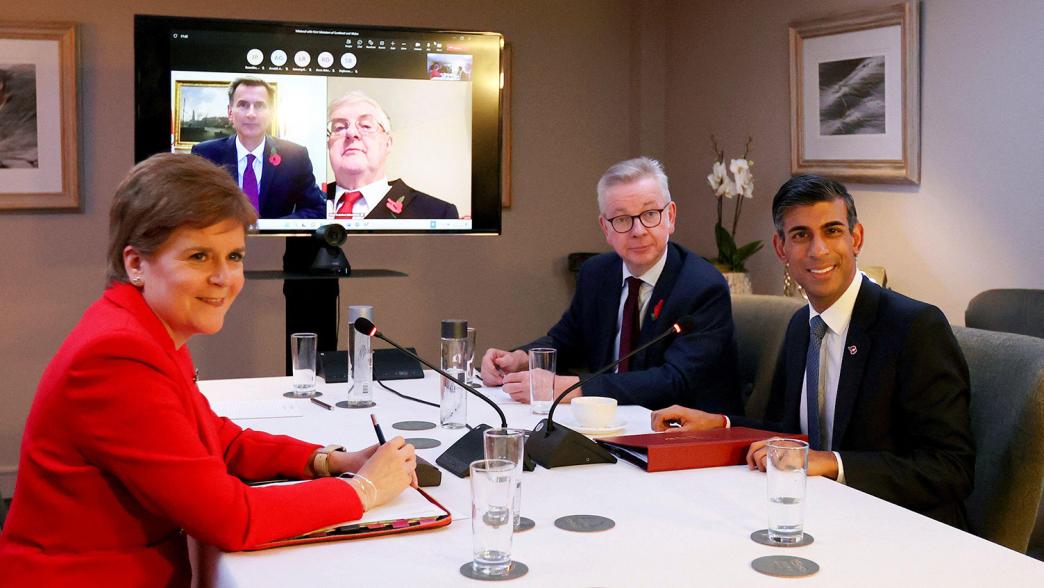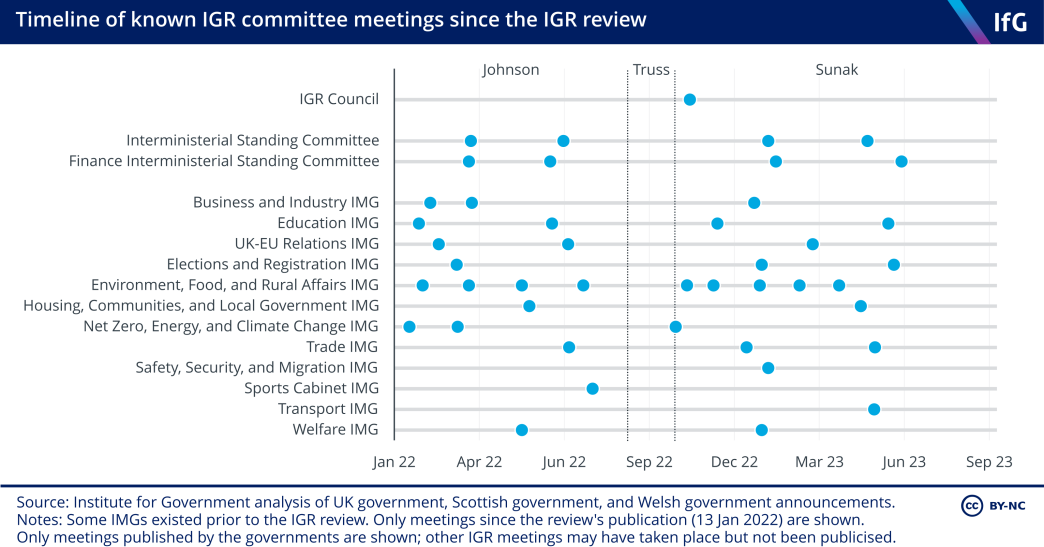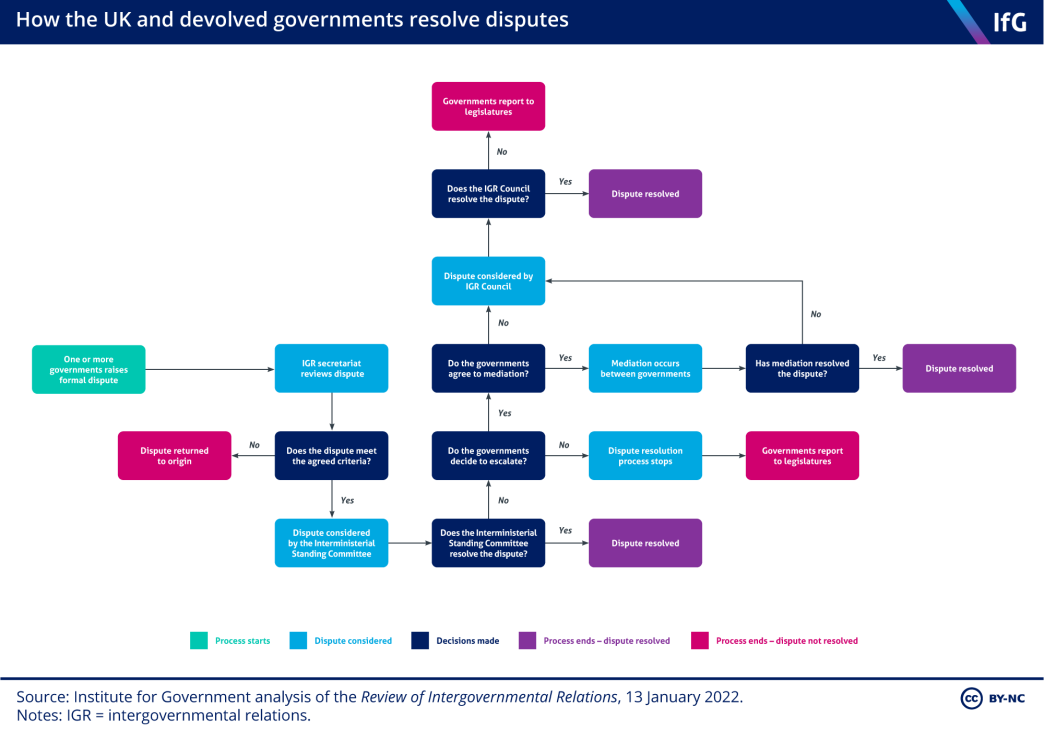Intergovernmental relations
How do officials and ministers across the UK cooperate and resolve disputes?

What are intergovernmental relations?
Intergovernmental relations (IGR) refers to engagement between ministers and officials from the UK government, Scottish government, Welsh government, and Northern Ireland executive. It covers multilateral and bilateral channels, including both formal and informal engagement.
The UK government and devolved administrations concluded a review of intergovernmental relations in January 2022, leading to the creation of a new framework and set of structures for managing intergovernmental relations. This review agreed five principles for future engagement:
- maintaining positive, constructive, and respectful relationships
- building and maintaining trust
- sharing information and respecting confidentiality
- increasing understanding of intergovernmental activities
- resolving disputes through an agreed process. 23 Cabinet Office, Review of Intergovernmental Relations, p. 1, https://assets.publishing.service.gov.uk/government/uploads/system/uploads/attachment_data/file/1046083/The_Review_of_Intergovernmental_Relations.pdf
The new IGR framework superseded the Joint Ministerial Committee (JMC) system that had been established in 1999, and which had been widely criticised for its lack of transparency, irregular meeting schedules, and weak dispute resolution protocol. 24 Scottish Parliament Information Centre, Intergovernmental relations, p. 3, https://sp-bpr-en-prod-cdnep.azureedge.net/published/2022/6/8/a00e9e5a-089c-4952-a917-2ac2297fc83f/SB%2022-31.pdf The JMC system had largely ceased to function by 2022.
Separately, the Belfast/Good Friday Agreement created the British-Irish Council. This consists of the governments of the UK, Ireland, Guernsey, Jersey, the Isle of Man, Scotland, Wales, and Northern Ireland. The British-Irish Council was not covered by the IGR review.
What are the formal structures for intergovernmental engagement?
A three-tier committee structure provides for formal multilateral engagement between ministers, which is supplemented by informal interaction at both political and official levels.
The Prime Minister and Heads of Devolved Government Council
The Prime Minister and Heads of Devolved Government Council (the Council) is the top tier of the new structure.
Chaired by the prime minister, its membership also includes the first ministers of Scotland and Wales, as well as the first minister and deputy first minister of Northern Ireland. Other ministers are invited as necessary. For example, Jeremy Hunt attended as Chancellor in November 2022 to discuss the economy and the cost of living.
The Council considers strategic issues affecting the UK as a whole and provides direction to the wider IGR structure.
Interministerial Standing Committee and Finance Interministerial Standing Committee
The middle tier consists of a general Interministerial Standing Committee (IMSC) and the Finance Interministerial Standing Committee (F:ISC). Additional time-limited interministerial committees may be established at this tier to address specific issues.
IMSC provides a forum for ministers to discuss strategic issues wider than individual portfolios and to keep the effectiveness of portfolio-level engagement under review. Its membership varies to allow relevant departmental ministers to attend, but always includes the ministers responsible for IGR across the four governments.
F:ISC has a similar strategic remit to IMSC, but it focuses on financial and economic matters and is made up by finance ministers from the UK government and devolved administrations.
Interministerial Groups
Interministerial Groups (IMGs) are the lowest tier. These are intended to facilitate regular portfolio-level discussion between departmental ministers from the four governments. For example, the June 2023 Education IMG discussed the use of digital technologies to improve learning and teaching and reduce teacher workloads. 25 Department for Education, UK Education Ministers Council Communique: 8 June 2023, www.gov.uk/government/publications/communiques-from-the-interministerial-group-for-education
Senior officials from Northern Ireland currently attend IGR committees in place of ministers owing to the lack of a power-sharing executive.
How often do the intergovernmental committees meet?
Intergovernmental committees are intended to meet regularly. Individual committees can agree to meet more or less frequently, but in general IMGs are expected to meet every two months, IMSC and F:ISC quarterly, and the Council annually.
However, this varies in practice. Some committees – such as the Environment, Food, and Rural Affairs IMG – have largely followed the intended schedule, while others – such as the Business and Industry IMG – have met more irregularly.

Meetings have been held in 12 IMGs. This is fewer than anticipated in the review, which included a non-exhaustive list of 19 areas where IMGs were expected to operate. Consequently, there are no known IMGs operating in major policy areas including health and justice.
No meetings of any IGR bodies were held during the premiership of Liz Truss, who also did not speak with the first ministers of Scotland and Wales during her short time in Downing Street. By contrast, Rishi Sunak spoke with both Nicola Sturgeon and Mark Drakeford and chaired a Council meeting shortly after taking office.
Other ministerial engagement happens outside the formal IGR committee system, with the UK government recording a total of 277 bilateral or multilateral meetings between UK and devolved ministers in 2022. 26 Cabinet Office, Intergovernmental Relations Review Annual Report for 2022, p. 6, www.gov.uk/government/publications/intergovernmental-relations-review-annual-report-for-2022
Can decisions in intergovernmental committees bind governments?
Governments cannot be bound by the IGR committees. The review declared the structures were a “statement of political intent” which do not “create new, or override existing, legal relations or obligations”.
All decisions are intended to be reached by consensus rather than majority vote.
What is the IGR Secretariat?
The IGR Secretariat supports the IGR committees by determining the dates and locations of the meetings, compiling and distributing background papers and meeting minutes, and drafting annual reports on IGR for scrutiny by the four legislatures. It also facilitates the formal dispute resolution process.
It is made up of officials from all four governments and accountable to the Council as a whole, rather than any single government. Secretariat support to the previous JMC system was provided by officials from the UK government, causing its independence to occasionally be questioned by devolved governments. 27 Scottish Parliament Information Centre, Intergovernmental relations, p. 11, https://sp-bpr-en-prod-cdnep.azureedge.net/published/2022/6/8/a00e9e5a-089c-4952-a917-2ac2297fc83f/SB%2022-31.pdf
How are disputes between the UK and devolved governments handled?
Governments are expected to work together to avoid disagreements and resolve them at portfolio-level where possible, but a dispute resolution process exists where this fails.
Any government can raise a dispute: no other government can reject this decision. However, disputes can only be considered through the formal process after extensive consideration at portfolio-level by officials and ministers and the issue must have implications beyond a single policy area, including the potential to harm intergovernmental relations. Disputes that do not meet these criteria are not dealt with via this process.
Disputes that meet these criteria are first considered by the IMSC or the F:ISC, depending on the nature of the disagreement. IMSC or F:ISC will attempt to resolve the dispute, but further escalation to the Council is possible as the final step of the process. Governments are encouraged to seek mediation before reaching this point.
Independent third-party advice and evidence can also be commissioned to inform the resolution of most non-financial disputes. This must be sought if any government involved in the dispute requests it. The advice produced is non-binding and intended to “inform subsequent discussion.”
Governments are required to report to their legislatures if disputes are unresolved and explain why dispute resolution was unsuccessful.
No disputes have been officially resolved through this process. It was reported that the Northern Ireland executive raised a dispute with the Treasury in autumn 2022, but the outcome remains unclear. 28 Senedd Cymru, ‘Finance Committee: 29 September 2022’, https://record.senedd.wales/Committee/12964#C448133
The previous JMC dispute resolution protocol was invoked four times. Three disputes covered funding allocations, with the fourth related to fishing quotas.

What intergovernmental processes are used to manage the domestic implications of Brexit?
Operating in parallel with the IGR structures discussed above, a set of ‘common frameworks’ have been negotiated to facilitate coordination and manage divergence in devolved policy areas that were previously covered by EU law.
Only one common framework – relating to planning around hazardous substances – has been fully approved. A further 27 common frameworks are in operation but in provisional form, requiring final approval from UK and devolved ministers. 31 Cabinet Office, UK Common Frameworks, 28 February 2023, retrieved 9 August 2023, www.gov.uk/government/collections/uk-common-frameworks#uk-common-frameworks-(provisional)
Common frameworks also intersect with the UK Internal Market Act (IMA), which allows for goods produced in one part of the UK to be sold in other parts without additional requirements. UK ministers can grant exemptions to allow local regulations to apply to all goods sold in a devolved administration, rather than just goods produced there. Requests for exclusions can be made through the relevant common framework.
The Scottish government successfully sought an exemption for its ban on single use plastics, which was agreed by the UK government. 32 Damon Davies, ‘Scotland’s Ban on Single-Use Plastics: a case study of the impact of the UK Internal Market Act’, Scottish Parliament Information Centre, 27 October 2022, https://spice-spotlight.scot/2022/10/27/scotlands-ban-on-single-use-plastics-a-case-study-of-the-impact-of-the-uk-internal-market-act/ It also attempted to use this process for an exemption to allow its bottle deposit return scheme to be implemented, but the UK government was only willing to issue a partial exemption on that occasion.
- Topic
- Devolution
- United Kingdom
- England Scotland Northern Ireland Wales
- Administration
- Johnson government Truss government Sunak government
- Devolved administration
- Northern Ireland executive Scottish government Welsh government
- Public figures
- Rishi Sunak Mark Drakeford Nicola Sturgeon Humza Yousaf
- Publisher
- Institute for Government